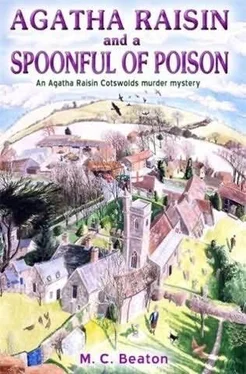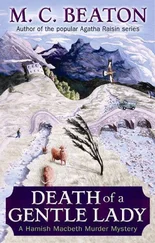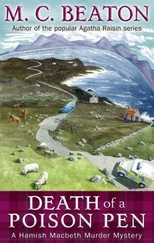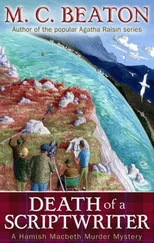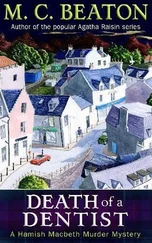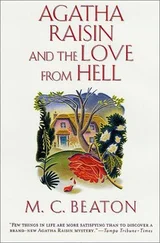
M C Beaton
A Spoonful of Poison
Book 19 in the Agatha Raisin series, 2008
This book is dedicated to my three bookselling angels
at the Cotswold Bookstore, Moreton-in-Marsh,
Gloucestershire-Tony Keats, David Whitehead and Nina
Smith .
MRS. BLOXBY, WIFE OF THE VICAR of Carsely, looked nervously at her visitor. “Yes, Mrs. Raisin is a friend of mine, a very dear friend, but she is now very busy running her detective agency and does not have spare time for-”
“But this is such a good cause,” interrupted Arthur Chance, vicar of Saint Odo The Severe in the village of Comfrey Magna. “The services of an expert public relations officer to bring the crowds to our annual fête would be most welcome. Proceeds will go to restore the church roof and to various charities.”
“Yes, but-”
“It would do no harm to just ask , now would it? It is your Christian duty.”
“I hardly need to be reminded of my duty,” said Mrs. Bloxby wearily, thinking of all the parish visits, the mothers’ meetings and the Carsely Ladies’ Society. Really, she thought, surveying the vicar, for such a mild, inoffensive-looking man he is terribly pushy. Arthur Chance was a small man with thick glasses and grey hair which stuck out in tufts like horns on either side of his creased and wrinkled face. He had married a woman twenty years his junior, Mrs. Bloxby remembered. He probably bullied her into it, she thought.
“Look! I will do what I can, but I cannot promise anything. When is the fête?”
“It is a week on Saturday.”
“Only about a week away. You are not giving Mrs. Raisin any time.”
“God will help her,” said Mr. Chance.
Agatha Raisin, a middle-aged woman who had sold up her successful public relations business to take early retirement in a cottage in the Cotswolds, had found that inactivity did not suit her and so had started up her own private detective agency. Now that it was successful, however, she wished she had more time to relax. Also, the cases which poured into the detective agency all concerned messy divorces, missing children, missing cats and dogs, and only the occasional case of industrial espionage. She had begun to close the agency at weekends, feeling she was losing quality time, forgetting that when she had plenty of quality time, she didn’t know what to do with it.
For a woman in her early fifties, she still looked well. Her hair, although tinted, was glossy and her legs good. Although she had small eyes, she had very few wrinkles. She had a generous bosom and a rather thick waist, which was her despair.
On Friday evening, when she arrived home, she fussed over her two cats, Hodge and Boswell, kicked off her shoes, mixed herself a generous gin and tonic, lit a cigarette, and lay back on the sofa with a sigh of relief.
She wondered idly where her ex-husband, James Lacey, was. He lived next door to her but worked as a travel writer and was often abroad. She rummaged around in her brain as usual, searching for that old obsession, that old longing for him, but it seemed to have gone forever. Agatha, without an obsession, was left with herself; and she forgot about all the pain and misery that obsession for her ex had brought and remembered only the brief bursts of elation.
The doorbell shrilled. Agatha swung her legs off the sofa and went to answer the door. Her face lit up when she saw Mrs. Bloxby standing there. “Come in,” she cried. “I’m just having a G and T. Want one?”
“No, but I’d like a sherry.”
Sometimes Agatha, often too aware of her slum upbringing, wondered what it would be like to be a lady inside and out like Mrs. Bloxby. The vicar’s wife was wearing a rather baggy tweed skirt and a rose-pink blouse which had seen better days. Her grey hair was escaping from a bun at the back of her neck, but she had her usual air of kindness and dignity.
The pair of them, as was the fashion in the Carsely Ladies’ Society, always called each other by their second names.
Agatha poured Mrs. Bloxby a sherry. “I haven’t seen you for a while,” said Agatha. “It’s been so busy.”
A brief flicker of guilt crossed Mrs. Bloxby’s grey eyes. “Have you still got that young detective with you, Toni Gilmour?”
“Yes, thank goodness. Excellent worker. But I think we will need to start turning down cases. I really don’t want to take on more staff.”
Mrs. Bloxby took a sip of sherry and said distractedly, “I knew you would be too busy. That’s what I told him.”
“Told who?”
“Mr. Arthur Chance. The vicar of Saint Odo The Severe.”
“The what?”
“An Anglo-Saxon saint. I forget what he did. There are so many of them.”
“So how did my name come up in your discussion with Mr. Chance?”
“He lives in Comfrey Magna-”
“Never been there.”
“Few people have. It’s off the tourist route. Anyway, they are having their annual village fête a week tomorrow and Mr. Chance wanted me to beg you to publicize the event for them.”
“Is there anything special about this vicar? Any reason why I should?”
“Only because it’s for charity. And he is rather pushy.”
Agatha smiled. “You look like a woman who has just been bullied. Tell you what, we’ll drive over there tomorrow morning and I will tell him one resounding no and he won’t bother you again.”
“That is so good of you, Mrs. Raisin. I am not very strong when it comes to saying no to good works.”
In the winter days, when the rain dripped down and thick wet fog covered the hills, Agatha sometimes wondered what she was doing buried under the thatch of her cottage in the Cotswolds.
But as she drove off with Mrs. Bloxby the following morning, the countryside was enjoying a really warm spring. Blackthorn starred the hedgerows, wisteria and clematis hung on garden walls, bluebells shook in the lightest of breezes, and a large blue sky arched overhead.
Mrs. Bloxby guided Agatha through a maze of country lanes. “Here we are at last,” she said finally. “Just park in front of the church.”
Agatha thought Comfrey Magna was an odd, secretive-looking village. There were no new houses to mar the straggling line of ancient cottages on either side of the road. She could see no one on the main street or in the gardens or even at the windows.
“Awfully quiet,” she commented.
“Few young people, that’s the problem,” said Mrs. Bloxby. “No first-time buyers, only last-time buyers.”
“Shouldn’t think houses would be all that expensive in a dead hole like this,” said Agatha, parking the car.
“Houses all over are dreadfully expensive.”
They got out of the car. “That’s the vicarage over there,” said Mrs. Bloxby. “We’ll cut through the churchyard.”
The vicarage was an old grey building with a sloping roof of old Cotswold tiles, the kind that cost a fortune but that the local council would never allow anyone to sell, unless they were going to be replaced with exactly the same thing, which, of course, defeated the purpose.
As they entered the churchyard, Agatha saw a man straightening up from one of the graves where he had been laying flowers. He turned and saw them and smiled.
Agatha blinked rapidly. He was tall, with fair hair, a lightly tanned handsome face, and green eyes. His eyes were really green, thought Agatha, not a fleck of brown in them. He was wearing a tweed sports jacket and cavalry-twill trousers.
“Good morning,” said Mrs. Bloxby pleasantly, but giving Agatha’s arm a nudge because that lady seemed to have become rooted to the spot.
Читать дальше
